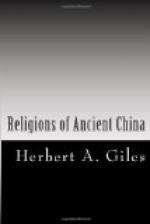Supernatural Manifestations.—Several events of a supernatural character are recorded as having taken place under the Chou dynasty. In B.C. 756, one of the feudal Dukes saw a vision of a yellow serpent which descended from heaven and laid its head on the slope of a mountain. The Duke spoke of this to his astrologer, who said, “It is a manifestation of God; sacrifice to it.”
In B.C. 747, another Duke found on a mountain a being in the semblance of a stone. Sacrifices were at once offered, and the stone was deified, and received regular worship from that time forward.
In B.C. 659, a third Duke was in a trance for five days, when he saw a vision of God, and received from Him instructions as to matters then pressing. For many generations afterwards the story ran that the Duke had been up to Heaven. This became a favourite theme for romancers. It is stated in the biography of a certain Feng Po that “one night he saw the gate of heaven open, and beheld exceeding glory within, which shone into his courtyard.”
The following story is told by Huai-nan Tzu (d. B.C. 122):—“Once when the Duke of Lu-yang was at war with the Han State, and sunset drew near while a battle was still fiercely raging, the Duke held up his spear and shook it at the sun, which forthwith went back three zodiacal signs.”
Only the Emperor worships God and Earth.—From the records of this period we can also see how jealously the worship of God and Earth was reserved for the Emperor alone.
In B.C. 651, Duke Huan of the Ch’i State, one of the feudal nobles to be mentioned later on, wished to signalise his accession to the post of doyen or leader of the vassal States by offering the great sacrifices to God and to Earth. He was, however, dissuaded from this by a wise Minister, who pointed out that only those could perform these ceremonies who had personally received the Imperial mandate from God.
This same Minister is said to be responsible for the following utterance:—
“Duke Huan asked Kuan Chang, saying, To what should a prince attach the highest importance? To God, replied the Minister; at which Duke Huan gazed upwards to the sky. The God I mean, continued Kuan Chung, is not the illimitable blue above. A true prince makes the people his God.”
Sacrifices.—Much has been recorded by the Chinese on the subject of sacrifice,—more indeed than can be easily condensed into a small compass. First of all, there were the great sacrifices to God and to Earth, at the winter and summer solstices respectively, which were reserved for the Son of Heaven alone. Besides what may be called private sacrifices, the Emperor sacrificed also to the four quarters, and to the mountains and rivers of the empire; while the feudal nobles sacrificed each to his own quarter, and to the mountains and rivers of his own domain. The victim offered by the Emperor on a blazing pile of wood was an ox of one colour, always a young animal;




